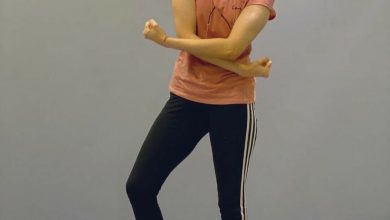Amnesty International calls for the release of Saudi fitness expert jailed over ‘clothing choices’

uman rights groups Amnesty International and ALQST — a London-based Saudi rights organisation — have called for the immediate release of Manahel al-Otaibi, a fitness expert they say was jailed for 11 years for her clothing choices and advocacy for women’s rights. Saudi Arabia says she was jailed for terrorism offences.
According to Amnesty International, al-Otaibi was sentenced in a “secret hearing before the country’s notorious counter-terrorism court, the Specialised Criminal Court, on January 9, 2024, but the decision was only revealed weeks later in the Saudi government’s formal reply to a request for information in a Joint Communication by UN Special Rapporteurs about her case”.
The rights group said that the charges against her pertained to her choice of clothing, publishing videos of herself wearing ‘indecent clothes’ and going shopping without an abaya. Saudi Arabia does not have laws mandating women to wear abayas in public spaces, however, culturally women are encouraged to cover up.
The charges against her include her expression of views online, which included a call to end Saudi Arabia’s male guardianship system — which, according to the Human Rights Watch, is Saudi Arabia’s first codified law on personal status that “formally enshrines male guardianship over women; the law contains discriminatory provisions against women concerning marriage, divorce, and decisions about their children”.
Al-Otaibi’s sister, Fawzia al-Otaibi faces similar charges, but fled Saudi Arabia fearing arrest after being summoned for questioning in 2022, Amnesty International added.
However, the Saudi regime is insistent that al-Otaibi was charged under articles 43 and 44 of the Kingdom’s counter-terrorism laws, which criminalise “any person who creates, launches, or uses a website or a program on a computer or on an electronic device … or to publish information on the manufacture of incendiary devices, explosives, or any other devices used in terrorist crimes”, as well as “any person who, by any means, broadcasts or publishes news, statements, false or malicious rumours, or the like for committing a terrorist crime”.
In a formal reply to a request for information in a Joint Communication by UN Special Rapporteurs about her case, Saudi Arabia stated that “the individual in question was convicted of terrorist offences that have no bearing on her exercise of freedom of opinion and expression or her social media posts”.
“Her acts cannot be justified under any circumstances, whatever considerations of a political, philosophical, ideological, racial, ethnic, religious or any other nature may be invoked to explain them,” the document stated.
Amnesty International held that Al-Otaibi’s family have not had access to her court documents, or the evidence presented against her.
“Manahel’s conviction and 11-year sentence is an appalling and cruel injustice. Since the moment she was arrested, Saudi Arabia’s authorities have subjected her to a relentless catalogue of abuses, from unlawful detention for supporting women’s rights to enforced disappearance for over five months while she was being secretly interrogated, tried and sentenced and subjected to repeated beatings by others in the prison,” said Bissan Fakih, Amnesty International’s Campaigner on Saudi Arabia.
She also stated, “With this sentence the Saudi authorities have exposed the hollowness of their much-touted women’s rights reforms in recent years and demonstrated their chilling commitment to silencing peaceful dissent”.
“Manahel’s confidence that she could act with freedom could have been a positive advertisement for Mohammed bin Salman’s much-touted narrative of leading women’s rights reforms in the country. Instead, by arresting her and now imposing this outrageous sentence on her, the Saudi authorities have once again laid bare the arbitrary and contradictory nature of their so-called reforms, and their continuing determination to control Saudi Arabia’s women,” said Lina Alhathloul, ALQST’s Head of Monitoring and Advocacy.
Al-Obtaibi had been a believer in Crown Prince Mohammed bin Salman’s promises of reform. Amnesty International reported that in a 2019 TV interview with German broadcaster Deutsche Welle, she said the reforms made her feel free to express her views and wear what she liked, because of MBS’ declarations.
Despite her belief in the changes, she was arrested on November 16, 2022. Amnesty International detailed that following her arrest, al-Otaibi was subjected to physical and psychological abuse in Riyadh’s Malaz Prison, and was forcibly disappeared for five months from November 5, 2023 until April 2024.
“On April 14, 2024, when she was finally able to contact her family again, she told them she was being held in solitary confinement and had a broken leg as a result of physical abuse. She also said she was denied healthcare.”
According to the Saudi government’s response to the UN, as of January 25, 2024, al-Otaibi’s sentencing was subject to appeal and her case remained “under consideration before the courts”. The response also maintained that al-Otaibi was not held in solitary confinement and had access to free healthcare.
Since the rights groups condemned al-Otaibi’s incarceration, the internet has also called for her release and censured the Saudi government’s actions. Amnesty International Secretary General Agnes Callamard took to X (formerly Twitter) to call for al-Otaibi’s “immediate and unconditional release”.
Another netizen stated that sports organisations should not “blindly” accept Saudi money “as a cover for their misogyny and reprehensible human rights record.”
Others called for al-Otaibi to be remembered the “next time Saudi Arabia promotes another music festival as a symbol of their progressiveness”.
Amnesty International maintains that the Saudi government’s action against al-Otaibi comes amid an intensified crackdown on free speech in Saudi Arabia, including online expression.
“In the past two years, Saudi courts have convicted and handed down lengthy prison terms on dozens of individuals for their expression on social media, including many women, such as Salma al-Shehab (27 years), Fatima al-Shawarbi (30 years), Sukaynah al-Aithan (40 years) and Nourah al-Qahtani (45 years).”





